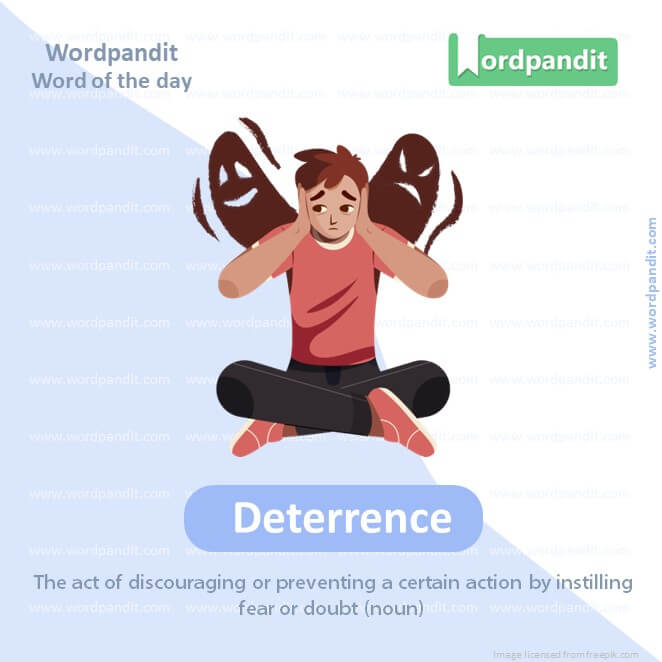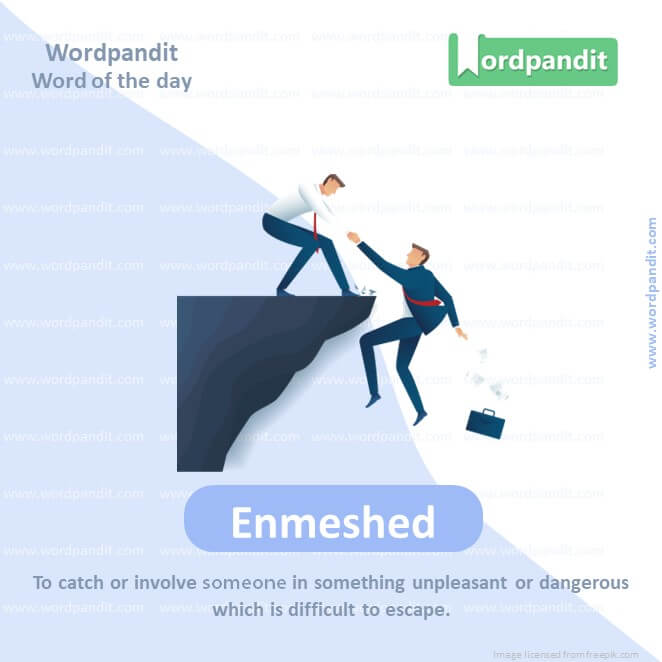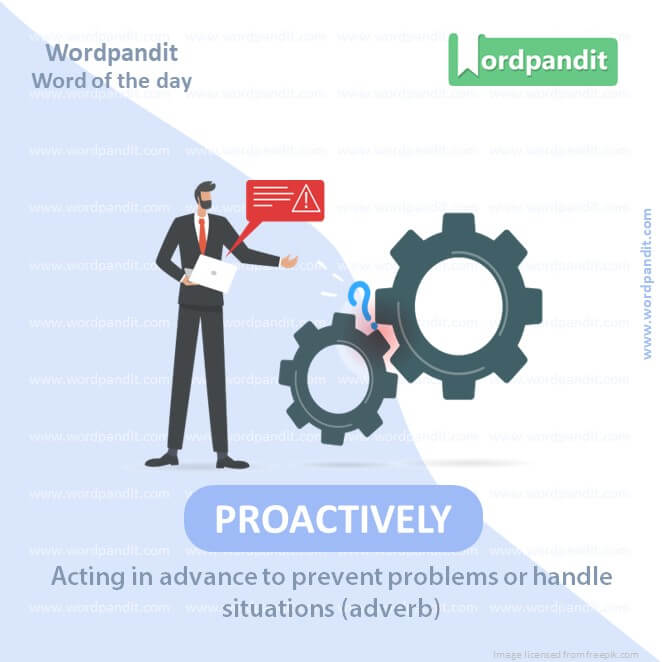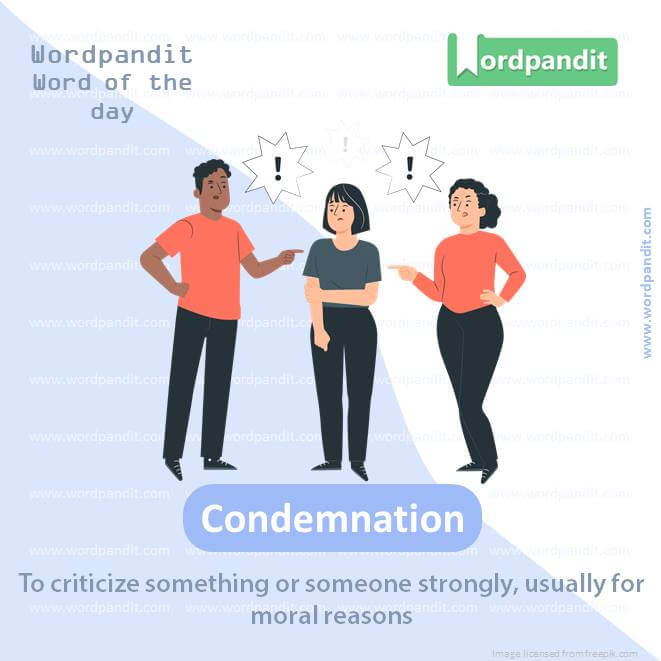Daily Vocabulary Words: Enhance Your Lexicon with Leading Newspapers & Publications
Welcome to the Daily Vocabulary section at Wordpandit!
Our mission is straightforward: to bring you essential vocabulary words featured in top newspapers and publications worldwide. By focusing on words you’ll encounter in renowned sources, we aim to help you enhance your vocabulary effectively and practically.
Our selection includes words from:
– The New York Times
– The Washington Post
– Scientific American
– BBC
– The Guardian
– Psychology Today
– Wall Street Journal
– The Economist
– The Hindu
– The Times of India
– The Economic Times
– Hindustan Times
– Live Mint
– The Indian Express
– And many more.
We are committed to your vocabulary development. Simply visit this section regularly and explore the daily posts. This is your go-to repository for commonly used words, providing significant practical benefits by familiarizing you with vocabulary from the leading publications listed above.
Make it a habit to visit our website daily and expand your lexicon with words from top newspapers and publications. (edited)

WORD 1: Deterrence
CONTEXT: Israel also wanted to free the over 240 hostages in Hamas custody, and bolster its deterrence that was weakened by the Hamas attack.
SOURCE: The Hindu
EXPLANATORY PARAGRAPH: Imagine you have a big, scary barking dog sign in your front yard to keep strangers from coming in and taking your toys. Deterrence is like that sign; it’s meant to stop someone from doing something by making them think twice about it because they are scared of what might happen if they do it.
MEANING: The act of discouraging or preventing a certain action by instilling fear or doubt (noun)
PRONUNCIATION: deh-TUR-rens
SYNONYMS: Prevention, discouragement, dissuasion, intimidation, restraint
USAGE EXAMPLES:
1. The security system served as a deterrence against burglaries.
2. Countries use nuclear weapons for deterrence.
3. The harsh penalties were intended as a deterrence to future offenders.
4. His reputation as a strict teacher was a deterrence to classroom misbehavior.

WORD 2: Enmeshed
CONTEXT: Israel is still fighting Hamas in a besieged enclave of Gaza, a war with Hezbollah, which is deeply enmeshed into Lebanon’s state and Shia society, will be a lot more dangerous and difficult.
SOURCE: The Hindu
EXPLANATORY PARAGRAPH: Imagine getting your clothes caught in the branches of a bush when you’re playing hide and seek, making it hard to get out. Being enmeshed is like that, but it can happen with things you can’t see, like being caught up in a tricky situation or problem.
MEANING: To catch or involve someone in something unpleasant or dangerous
which is difficult to escape.
PRONUNCIATION: en-MESHED
SYNONYMS: Entangled, involved, entwined, caught up, embroiled
USAGE EXAMPLES:
1. She became enmeshed in a lengthy legal battle.
2. The new employee quickly got enmeshed in office politics.
3. The whale was tragically enmeshed in fishing nets.
4. They were deeply enmeshed in a web of deceit.
WORD 3: Perpetual
CONTEXT: This is a long-term setback to Israel’s policy of perpetual marginalisation of the Palestine question.
SOURCE: The Hindu
EXPLANATORY PARAGRAPH: Imagine a toy train that runs on a track forever without stopping. Perpetual is like that train; it keeps going and going without an end, like having a birthday party that never stops.
MEANING: Never ending or changing (adjective)
PRONUNCIATION: per-PECH-oo-ul
SYNONYMS: Everlasting, continuous, unending, eternal, incessant
USAGE EXAMPLES:
1. He seemed to have a perpetual smile on his face.
2. The clock was a gift, symbolizing their perpetual love.
3. They lived in a state of perpetual uncertainty.
4. The device was designed to provide perpetual motion.
WORD 4: Entrenchment
CONTEXT: Its success was in how it tried to address together a variety of exclusions based on class, caste, and linguistic identities. This was achieved through struggles and entrenchment in the arena outside elections: in civil society and the cultural sphere.
SOURCE: The Hindu
EXPLANATORY PARAGRAPH: Imagine building a sandcastle with a deep moat around it so it’s hard for anyone to break it down. Entrenchment is like that moat; it’s when people make their position very strong and difficult to change.
MEANING: The act of establishing an entrenched position or state that is difficult to change (noun).
PRONUNCIATION: en-TRENCH-ment
SYNONYMS: Fortification, consolidation, embedment, rooting, deepening
USAGE EXAMPLES:
1. The entrenchment of traditional values in the community was notable.
2. His ideas led to further entrenchment of the policy.
3. The company’s entrenchment in the market made it a leading competitor.
4. Entrenchment in old habits can make change difficult.
WORD 5: Accentuated
CONTEXT: This has only accentuated in the recent years with their heightened activities around temples and festivals.
SOURCE: The Hindu
EXPLANATORY PARAGRAPH: Imagine drawing a picture and using a bright marker to make certain parts stand out more than others. Accentuated is like using that marker; it’s when something is made more noticeable or prominent.
MEANING: Made more noticeable or prominent, highlighted (adjective).
PRONUNCIATION: ak-SEN-choo-ay-ted
SYNONYMS: Emphasized, highlighted, underscored, intensified, stressed
USAGE EXAMPLES:
1. Her dress accentuated her elegant posture.
2. The lighting in the room accentuated the colors of the paintings.
3. His speech accentuated the need for immediate action.
4. The spices accentuated the natural flavors of the dish.
WORD 6: De-radicalised
CONTEXT: The communist parties have de-radicalised since the achievement of major economic goals such as the land reforms.
SOURCE: The Hindu
EXPLANATORY PARAGRAPH: Imagine if someone taught you to always yell when you’re upset. De-radicalised is like learning new ways to calm down and talk instead of yelling. It’s when someone stops believing in extreme ideas and starts thinking about things in a calmer, more ordinary way.
MEANING: The process or result of causing someone to abandon radical or extremist views (adjective).
PRONUNCIATION: dee-RAD-ih-kuh-lized
SYNONYMS: Reformed, moderated, rehabilitated, transformed, normalized
USAGE EXAMPLES:
1. The program successfully de-radicalised several former extremists.
2. His views were gradually de-radicalised after attending the workshops.
3. The community’s effort to de-radicalise youth has shown promising results.
4. The documentary featured stories of de-radicalised individuals.

WORD 7: Proactively
CONTEXT: Rather than proactively fashion new ideological programmes, the Left has been reacting to the Right’s rise producing vacillations and contradictions.
SOURCE: The Hindu
EXPLANATORY PARAGRAPH: Imagine you clean up your room before your mom asks you to because you know she will be happy. Proactively is like that; it’s when you do something good before someone tells you to do it because you want to make things better right away.
MEANING: Acting in advance to prevent problems or handle situations (adverb)
PRONUNCIATION: pro-AK-tiv-lee
SYNONYMS: Preemptively, preventatively, anticipatively, beforehand, actively
USAGE EXAMPLES:
1. She proactively completed her assignments ahead of deadlines.
2. The company proactively updated its systems to avoid security breaches.
3. Proactively managing your time can lead to better productivity.
4. He proactively sought feedback to improve his performance.

WORD 8: Reinvigorated
CONTEXT: It can only happen through a reinvigorated democracy in which the tasks of class, caste, and gender equality are completed. Dalits and Adivasis are still at the bottom of the socioeconomic hierarchy of Kerala, belying the promise of communist equality.
SOURCE: The Hindu
EXPLANATORY PARAGRAPH: Imagine feeling very tired after playing all day, and then you drink a big glass of your favorite juice and suddenly feel full of energy again. Reinvigorated is like that juice; it’s when something makes you feel fresh, strong, and full of energy once more.
MEANING: Made to feel fresh or strong again (adjective)
PRONUNCIATION: ree-IN-vig-uh-ray-ted
SYNONYMS: Revitalized, rejuvenated, renewed, refreshed, reenergized
USAGE EXAMPLES:
1. The team felt reinvigorated after the inspiring speech.
2. The vacation reinvigorated her enthusiasm for work.
3. The rain reinvigorated the parched garden.
4. He was reinvigorated by the support from his friends.
WORD 9: Disenchantments
CONTEXT: If the marginalised find the new imaginations offered by the Hindutva forces attractive, it is also located in secular disenchantments.
SOURCE: The Hindu
EXPLANATORY PARAGRAPH: Imagine you always thought a magic trick was real magic, but then someone showed you how the trick was done. Disenchantments is when you feel a little sad or disappointed because something isn’t as special or magical as you thought it was.
MEANING: Feelings of disappointment about something that one discovers to be less good than one had believed (noun).
PRONUNCIATION: dis-en-CHANT-ments
SYNONYMS: Disillusionments, disappointments, dissatisfaction, disillusions, letdowns
USAGE EXAMPLES:
1. The realities of adult life led to his disenchantments with childhood dreams.
2. Many voters felt disenchantments with the political process.
3. The disenchantments of the job outweighed its benefits.
4. She shared her disenchantments during the meeting.

WORD 10: Condemnation
CONTEXT: While the JD(U) issued statements to blunt the condemnation that came his way, the Rashtriya Janata Dal (RJD), which had been defeated in the constituency, asserted that a leader after winning an election becomes the representative of an area and that “he should work for everyone without categorising caste and community”.
SOURCE: The Hindu
EXPLANATORY PARAGRAPH: Imagine if someone at school was not sharing toys and the teacher said it was not nice to do that. Condemnation is like when adults strongly say that something someone did was very wrong or bad.
MEANING: To criticize something or someone strongly, usually for moral reasons
PRONUNCIATION: kon-dem-NAY-shun
SYNONYMS: Censure, criticism, denunciation, reproach, disapproval
USAGE EXAMPLES:
1. The act received widespread condemnation from the community.
2. His harsh words met with condemnation from all sides.
3. The policy drew condemnation from international leaders.
4. The condemnation of the corrupt practices was unanimous.
Vocabulary Words
When delving into the dynamic world of languages, the grandeur of ‘vocabulary words’ is all-encompassing. The importance of ‘vocabulary words’ in effective communication cannot be overstated; it’s these words that form the backdrop of any language, painting intricate pictures of thoughts and ideas.
Starting on the journey of learning ‘vocabulary words’, one should steer clear from rote memorization. The traditional structure of merely repeating words lacks the necessary context and application that actually embeds these words into your memory. To truly master the ‘vocabulary words’, one needs an integrated, immersive approach.
The first step towards mastering ‘vocabulary words’ is to engage with varied language mediums. Expanding beyond textbooks to read fiction, articles, blogs, and other forms of content not only diversifies your vocabulary but also acts as a mirror to reflect the practical application of these words. Essentially, you’re exposed to the words as they are commonly used, allowing you to truly understand their essence.
Empowering this journey, tech tools like language learning apps and memory-enhancing flashcards significantly aid in learning ‘vocabulary words’. These interactive tools provide a more engaging learning experience and hone word retention. Mnemonic devices, associating words with a unique story or visual image, enrich the process and make memory recall more efficient.
Practicing ‘vocabulary words’ by using them in day-to-day conversations exemplifies learning by doing. It also strengthens the neural pathways and improves overall word recall. This, coupled with regular revisions, ensures your grasp over ‘vocabulary words’ remains strong.
In conclusion, learning ‘vocabulary words’ is not just about adding words to your linguistic cupboard, but understanding their essence and utilizing them effectively. An inclusive approach to learning that combines diverse reading materials, technology tools, mnemonic devices and practice can really propel your mastery over ‘vocabulary words’. Remember, language is the bloodline of communication, and ‘vocabulary words’ are its heartbeat. ‘











